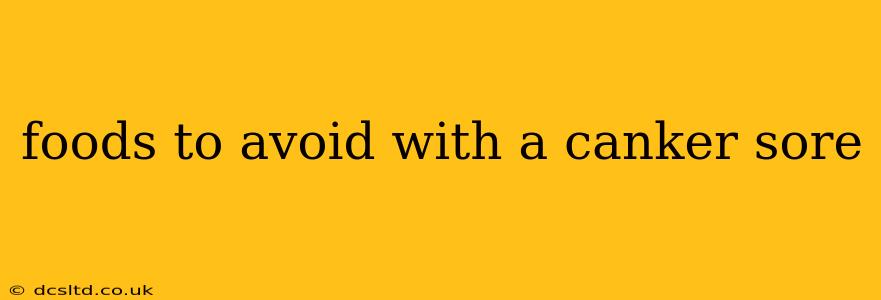Canker sores, those pesky little ulcers that appear inside your mouth, can be incredibly painful and make eating a real challenge. While they typically heal on their own within a week or two, certain foods can aggravate them and prolong the healing process. Understanding which foods to avoid is key to managing your discomfort and promoting faster healing. This guide will explore the foods to steer clear of, along with frequently asked questions about managing canker sores.
What Foods Trigger Canker Sores?
Certain foods are known to irritate the sensitive tissues of a canker sore, increasing pain and inflammation. These often fall into categories based on their texture, acidity, or spiciness. Let's break them down:
-
Acidic Foods: Citrus fruits (oranges, lemons, limes, grapefruits), tomatoes, and acidic juices can exacerbate the burning sensation and inflammation associated with canker sores. The high acidity levels can directly irritate the already sensitive ulcer.
-
Spicy Foods: Chili peppers, hot sauces, and other spicy foods contain capsaicin, a compound that creates a burning sensation. This will undoubtedly increase the pain and discomfort of your canker sore.
-
Rough or Crunchy Foods: Anything that requires excessive chewing can rub against the canker sore and cause further irritation. This includes chips, crackers, nuts, and even certain types of bread.
-
Salty Foods: Excessive salt can draw fluid out of the sore, making it drier and more painful. While a little salt is fine, avoid overly salty snacks or meals.
-
Hard Foods: Foods that require significant chewing force, such as hard candies or certain types of crusty bread, can further traumatize the delicate tissue of the canker sore.
What are some other things that can cause canker sores?
While diet plays a significant role, other factors can contribute to the development or worsening of canker sores:
-
Stress: High stress levels are often linked to increased canker sore frequency.
-
Hormonal Changes: Fluctuations in hormone levels, particularly during menstruation, can trigger canker sores in some individuals.
-
Vitamin Deficiencies: Deficiencies in certain vitamins, such as B12 and iron, have been associated with an increased risk of canker sores. However, it’s important to note this isn't a direct cause-and-effect relationship and a balanced diet is key.
-
Mouth Injuries: Accidental biting of the cheek or tongue can lead to canker sore formation.
Can I eat anything at all with a canker sore?
Absolutely! While you need to avoid certain irritants, there are many foods that are gentle on canker sores and promote healing. Focus on:
- Soft Foods: Mashed potatoes, yogurt, oatmeal, and well-cooked pasta are good choices.
- Smoothies: Blend fruits (avoiding citrus) and vegetables into a cooling smoothie.
- Soups: Broths and pureed soups are easy on the mouth.
- Bland Foods: Plain rice, toast, and bananas can be soothing.
How can I speed up the healing of my canker sore?
Along with dietary changes, several other strategies can promote faster healing:
- Rinse with Salt Water: A warm saltwater rinse can help clean the area and reduce inflammation.
- Over-the-Counter Medications: Many pain-relieving mouthwashes and topical ointments can ease discomfort.
- Good Oral Hygiene: Maintaining good oral hygiene by brushing and flossing gently (avoiding the sore itself) can help prevent infection.
Are there any specific foods that can help heal canker sores?
While no food directly "cures" canker sores, certain nutrient-rich options can support the healing process. Foods rich in Vitamin B12, iron, and zinc are beneficial for overall health and may indirectly contribute to faster healing.
When should I see a doctor about a canker sore?
Most canker sores heal within a week or two. However, you should consult a doctor if:
- Your canker sore is unusually large or painful.
- You experience recurring or persistent canker sores.
- Your canker sore shows signs of infection (increased pain, swelling, redness, pus).
By understanding which foods to avoid and incorporating the recommended strategies, you can effectively manage your canker sore discomfort and promote healing. Remember, a balanced diet and good oral hygiene are crucial for overall oral health.
